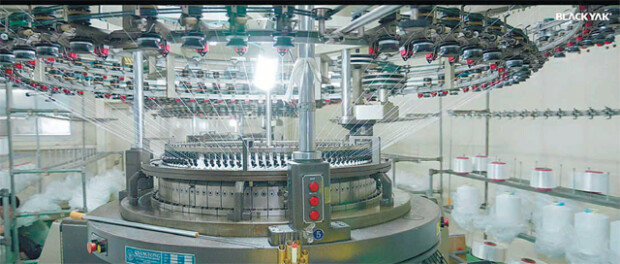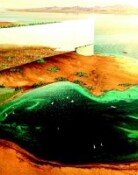Blackyak invests in ‘eco-friendly’ clothing
Blackyak invests in ‘eco-friendly’ clothing
Posted September. 28, 2020 08:02,
Updated September. 28, 2020 08:02

The fashion industry is turning to “eco-friendly fashion” to find a new growth engine after having been hit by the global COVID-19 pandemic. It hopes to attract the MZ generation, which is a combination of the millennial and Z generations, who are conscious of environmental impacts, animal rights and ethical values.
Blackyak, whose company name was changed to “BYN Blackyak” in February, is one of the outdoor clothing brands that are enthusiastic about producing green products. It created a taskforce called “New Life-Tex” earlier this year to formulate strategies that would allow for “a complete circulation of resources” where it collects plastic bottles, turn them into recycled fibers and produce and sell final products. Achieving a complete circulation of resources would differentiate the brand from its competitors who import recycled fibers from other countries such as Taiwan and Japan due to impurities-related issues. Blackyak signed a deal in May with TK Chemical, a chemical fiber manufacturing company of SM Group that is capable of producing recycled fibers from used plastic bottles in bulk, and started turning plastic bottles into recycled fibers for the first time in South Korea. It takes 15 500-milIliter plastic bottles to make one short sleeve t-shirt.
The first result came out in August. Blackyak released an environmentally friendly t-shirt using the recycled fiber and its technology. It plans to use the fiber to produce not only t-shirts but also pants, fleeces and outers.
For Blackyak, producing and selling “eco-friendly” clothing is not something that pays off immediately. The brand saw a decrease both in its market share and sales. It has the third to fifth largest market share, while its sales have decreased to 334.8 billion won last year after peaking at 580.5 billion won in 2013. Its plan is to continue with its investment in green fashion and become the leader of South Korea’s outdoor clothing market again based on the belief that “sustainability” is an important value to the MZ generation, who are the next generation of consumers.
Behind these strategies is Director Kang Jun-seok, the son of CEO Kang Tae-seon, who is also the largest shareholder of the brand. He led the efforts to acquire “Nau,” a U.S. outdoor clothing company based in Portland in 2015. He saw that the values of Nau, which pursuits sustainable fashion, were in line with the values that Blackyak was working towards as a brand. His green strategies, however, have yet to be proven effective. Nau makes a loss of about five billion won every year although it made a profit for the first time in four years since the acquisition in the first half of 2019.
Blackyak plans to expand its business in the United States, using Nau as a springboard, while it continues to expand its eco-friendly clothing business in South Korea. It has more than doubled the portion of green products in the S/S collection and the F/W collection, 118 percent and 123 percent respectively, compared to the previous year. It will also promote the awareness of eco-friendly products through Blackyak Alpine Clue, a hiking community which is mostly comprised of those in their 20s and 30s. “We will continue to invest in sustainable materials and production,” said a source from the brand.
Sung-Jin Park psjin@donga.com
Headline News
- N. Korea launches cyberattacks on S. Korea's defense companies
- Major university hospital professors consider a day off each week
- Italy suffers from fiscal deficits from ‘Super Bonus’ scheme
- Inter Milan secures 20th Serie A title, surpassing AC Milan
- Ruling and opposition prioritize spending amid tax revenue shortfalls







